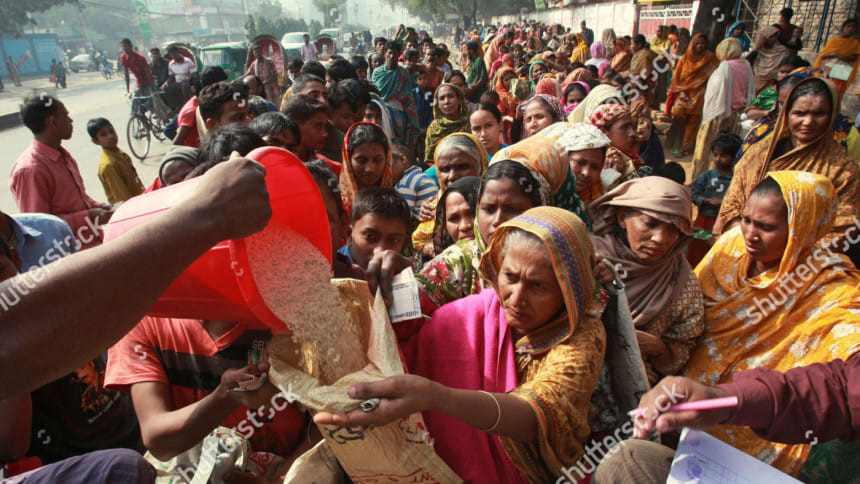Govt cuts food budget

The government has cut its target on food distribution, which supports poor and low-income people, by 5 per cent to 30.95 lakh tonnes in the next fiscal year from the revised budget of 2021-22, finance ministry documents showed.
Analysts, were, however critical of the reduction in the food distribution plan at a time when the food security of poor and vulnerable people is under threat in the face of high prices of the staple grain rice and a number of essential commodities for the war in Ukraine and erratic supply in the market.
During the current fiscal year, the food directorate distributed 28.86 lakh tonnes of rice and wheat through various programmes, including open market sales and the food-friendly programme, and the vulnerable group development scheme, from July 1, 2021, to June 2022, according to the food ministry data.
The amount was higher than the government's initial distribution plan of 28.36 lakh tonnes for the current fiscal year, according to finance ministry documents.
AMM Shawkat Ali, a former food adviser to the caretaker government, said the purchasing power of the poor and low-income groups has gone down amid rising inflationary pressure.
"The rice market is volatile. At this moment, the government's food distribution should increase to ensure the food security of the poor," he said, suggesting raising the allocation for public food distribution by 10 per cent from the revised allocation of 32.75 lakh tonnes for FY22.
He said keeping the food budget below the revised budget is not a correct assessment of the situation.
"If the government remains strict to it, it will definitely be anti-poor."
"Allocation should be reviewed and expanded during the coming lean season of September-October. Otherwise, there will be a silent effect of hunger."
The government has allocated Tk 14,116 crore for food distribution for FY23, down marginally from the revised allocation for FY22.
M Asaduzzaman, a former research director of the Bangladesh Institute of Development Studies (BIDS), said the allocation for public food distribution should have increased as many people fell into poverty for the coronavirus pandemic and the soaring prices of food for the war in Ukraine.
"Allocation should have been at least equal to the revised budget of the current fiscal year as a caution. The government will not use if it is not needed."
Quazi Shahabuddin, a former director-general of the BIDS, said the prices of essentials, including rice, are rising even during the peak harvesting season.
"So, the reduction from the revised budget could have been justified had the prices of rice declined. It will have an adverse impact on food security, particularly of the poor."
Md Shawkat Hossain, director-general of the Directorate General of Food, said the government may increase allocation depending on the situation.
The food directorate has planned to distribute more than 24 lakh tonnes of rice and over 8 lakh tonnes of wheat through various cash and non-cash programmes.
Hossain said his office sought to expand the coverage of the food-friendly programme to 60 lakh households from 50 lakh households. It has also expanded the OMS operation this year, he said.

 For all latest news, follow The Daily Star's Google News channel.
For all latest news, follow The Daily Star's Google News channel. 








Comments